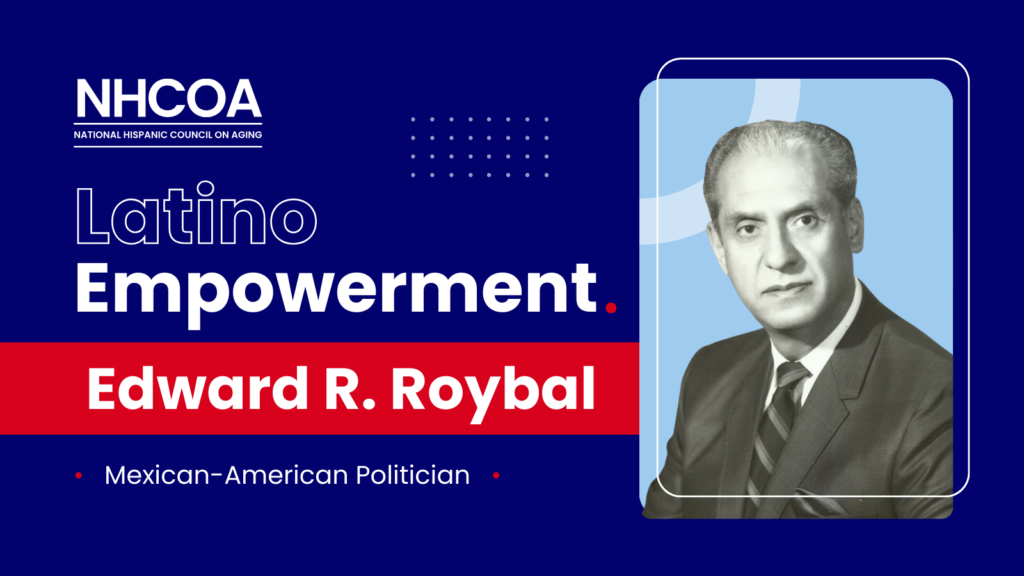
Congressman Edward R. Roybal is already known as one of the most prolific public servants in recent U.S. history. He is the namesake for many government buildings, schools, and medical centers. In fact, he is even the namesake of the National Institute on Aging’s (NIA) Centers for Translation Research in the Behavioral and Social Sciences of Aging, appropriately marking his passion and devotion to both the Aging and Latino communities. He was the representative for California Districts 30 (1963 to 1975) and 25 (1975 to 1993), but even before his public service as a congressman, Roybal devoted his time and efforts to matters of public health.
Edward R. Roybal was born in Albuquerque, New Mexico on February 10th, 1916, as one of 10 children, to parents Baudilio Roybal, a carpenter, and Eloisa (Tafoya) Roybal. Even prior to New Mexico’s statehood, which began in 1912 after over half a century as a US territory, Roybal’s family lived on New Mexico’s land for generations. But in 1922, the Roybals moved to Los Angeles, California, where Edward would attend public school until graduating high school in 1934. His young adult life was defined by work in public health, and the pursuit of his own higher education. Straight out of high school, Edward joined the Civilian Conservation Corp, an organization meant to help young men find work during the Great Depression. After a year with the CCC, he studied accounting and business administration at UCLA and Southwestern University. Following his studies, Edward became a public-health educator working with the California Tuberculosis Association, from 1942 to 1944. In 1944, Edward served one year as an infantry unit’s accountant in World War II. Following the war, he would return to California as the Director of Health Education for the Los Angeles County Tuberculosis and Health Association, and hold the position from 1945 to 1949.
In 1949, at 33 years old, Edward Roybal began his political career as the first Latino elected to the LA City Council, earning a reputation as a champion for civil rights. He won the election after galvanizing the city’s diverse neighborhoods to challenge the status quo through his efforts with the Community Service Organization. He continued to be re-elected to the position, serving as City Councilman for 13 years until he ran for Representative of California’s 30th district. Through his steady and honest service for the betterment of his community, Edward R. Roybal had gathered a huge level of support, and even had the endorsement of President John F. Kennedy.
During his 30 years in Congress, Congressman Edward R. Roybal accrued an incredible list of accolades that stand as a testament not only to his achievement, but to sheer progress within the United States political system. In 1968, he authored the legislation that established the National Bilingual Education Act, which enabled assistance to schools in meeting the educational needs of non-English speaking students. In 1983, he co-founded the House Select Committee on Aging, and served as its chairman until he finally retired from Congress in 1993. During these incredible thirty years, Congressman Roybal championed federal funding for Alzheimer’s disease medical services, he campaigned for the restoration of funding to programs for older adult and their housing, and he founded the Congressional Hispanic Caucus.
During his retirement, Congressman Roybal and his wife, Lucille Roybal, created the Lucille and Edward Roybal Foundation, which continues its work to fund education and social services to this day. Congressman Edward R. Roybal passed in 2005, and was later awarded a posthumous Presidential Medal of Freedom by President Obama, which was accepted by his daughter, Congressman Lucille Roybal-Allard, who continued her father’s legacy until leaving her position in 2023.
Edward R. Roybal emulates the cultural priorities and care signature to Hispanic and Latino communities, the very same that organizations like NHCOA aim to embody. His clear respect and dedication to both older adults and diverse communities, speaks to a level of integrity that should be admired and sought after by all. The journey he made from 1916, including the great depression, service in World War II, and a public service career that would span multiple wars throughout the remainder of the 20th century is a quintessentially American story. Edward R. Roybal is a prime example of Latino Empowerment, and should remain a role model to us all.
References:
– “Edward R. Roybal,” Former Members 1945-1977. GPO-CDOC. Govinfo.gov. https://www.govinfo.gov/content/pkg/GPO-CDOC-108hdoc225/pdf/GPO-CDOC-108hdoc225-2-6-5.pdf
– “Congressman Roybal Hoinored with Presidential Medal of Freedom,” News. USC Edward R. Roybal Institute on Aging. 11/24/2014. https://roybal.usc.edu/news/congressman-roybal-presidential-medal-of-freedom/
– “Congressman Edward R. Roybal.” USC Edward R. Roybal Institute on Aging. https://roybal.usc.edu/congressman-edward-r-roybal/
– “ROYBAL, Edward R.,” Biography. Biographical Directory of the United States Congress. https://bioguide.congress.gov/search/bio/R000485

Recent Comments